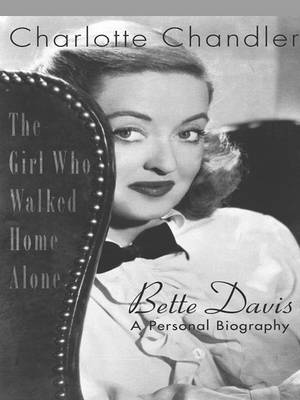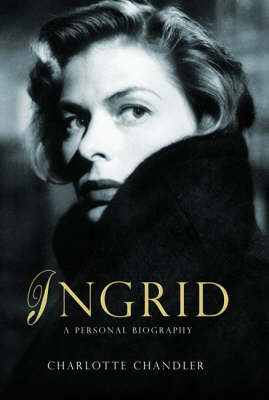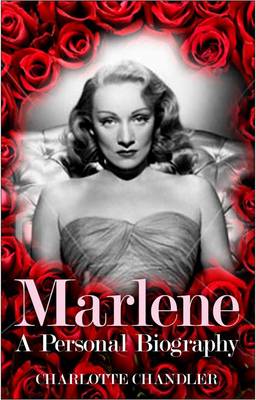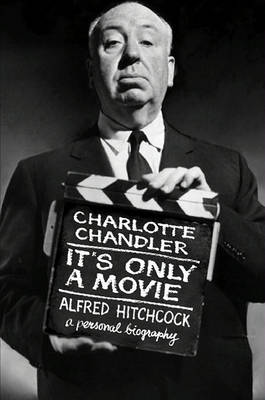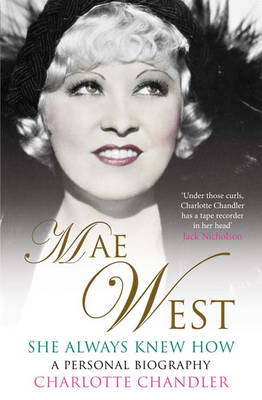Applause Books
6 total works
"Of Human Bondage", "Jezebel", "All About Eve", "Whatever Happened to Baby Jane". Just this short list of Bette Davis' films, gives an unmistakable sense of the role she played in twentieth-century cinema, as one of the finest performers in Hollywood history. Drawing on an extensive series of conversations that took place during the last decade of Bette Davis' life, this biography draws heavily on the actresses own words. Looking back over the decades, from her teenage decision to become an actress, to the pain and outrage over her daughter's bitter portrayal of her, Davis speaks with extraordinary candour. She explains how her father's abandonment of her, a child reverberated through her four marriages, and discusses the persistent Hollywood legend that she was difficult to work with. Immersing readers in the drama and glamour of movie-making's golden age, "The Girl Who Walked Home Alone" is a startling portrait of an enduring icon.
Ingrid Bergman was one of the biggest and most glamorous stars in Hollywood. She had starred in several now-classic films: Casablanca, Spellbound, Notorious, Gaslight; and her co-stars included such icons as Humphrey Bogart, Cary Grant and Gregory Peck. Already a movie star in her native Sweden, Ingrid Bergman became an instant sensation in Hollywood and the number one box-office star in the world. But the most dramatic event in her life took place off the screen when she made a film in Italy and began a passionate affair with her director, Roberto Rossellini. The scandal that followed left her exiled from America, ostracized from Hollywood, vilified by the press and separated from her young daughter. In the words of those who were involved, Chandler describes Bergman's life before, during and after the scandal. Among those Chandler spoke with were Alfred Hitchcock, George Cukor, Cary Grant and Greta Garbo. She also spoke with Roberto Rossellini, their twin daughters, Isabella and Isotta Ingrid, Rossellini's son Renzo, Ingrid's daughter Pia Lindstrom and others who knew Ingrid well.
This extraordinary access makes INGRID: A PERSONAL BIOGRAPHY the most perceptive and revealing book ever written about the charismatic Hollywood legend.
This extraordinary access makes INGRID: A PERSONAL BIOGRAPHY the most perceptive and revealing book ever written about the charismatic Hollywood legend.
In the mid-1970s Charlotte Chandler met Marlene Dietrich at the star's Paris apartment when her career was all but over. Elderly and in retirement, here was a screen legend who could, with the gift of hindsight give Chandler a fresh angle on her fascinating life. Marlene Dietrich began her career as a model in her native Berlin, becoming a stage and screen actress during the silent era, and a star with the worldwide success of The Blue Angel. Then, under the watchful eye of her mentor Josef von Sternberg, she broke America and became one of the brightest stars in Hollywood. A series of acclaimed pictures - Morocco, Shanghai Express, Blonde Venus, Destry Rides Again, among many others - propelled her to international stardom. With the outbreak of World War II, the fiercely anti-Nazi Dietrich became an American citizen and entertained Allied troops on the front lines. After the war she would embark on a new career as a stage performer and with her young music director, the gifted Burt Bacharach - whom Chandler. interviewed for the book - Dietrich enjoyed an outstanding second career.
By the late 1970s, however, plagued by accidents, Dietrich had become a virtual recluse in her Paris apartment, communicating with the outside world almost entirely by telephone. Marlene Dietrich lived an extraordinary life, and Marlene, A Personal Biography relies extensively on the star's own words and conversations with those who knew her well to reveal just how intriguing and fascinating that life really was.
By the late 1970s, however, plagued by accidents, Dietrich had become a virtual recluse in her Paris apartment, communicating with the outside world almost entirely by telephone. Marlene Dietrich lived an extraordinary life, and Marlene, A Personal Biography relies extensively on the star's own words and conversations with those who knew her well to reveal just how intriguing and fascinating that life really was.
A portrait based on interviews with the landmark movie icon, his family members, and his contemporaries profiles him as a devoted family man, notorious practical joker, and an Englishman whose Victorian tastes shaped his films. By the author of Nobody's Perfect. 25,000 first printing.
In this fascinating new biography of screen legend Joan Crawford, Charlotte Chandler draws on exclusive and remarkably candid interviews with Crawford herself and with others who knew her, including first husband Douglas Fairbanks, Jr., and Crawford's daughter Cathy. As a result, this biography is fresh and revealing, a brand-new look at one of Hollywood's most acclaimed stars.Joan Crawford was born Lucille LeSueur in San Antonio, Texas, in 1908 (as she always insisted, though other sources disagreed). Her father abandoned the family, and her mother soon remarried; Lucille was now known as Billie Cassin. Young Billie loved to dance and achieved her early success in silent films playing a dancer. Her breakthrough role came in "Our Dancing Daughters." Soon married to Hollywood royalty, Douglas Fairbanks, Jr. (who called her "Billie"), she was a star in her own right, playing opposite John Barrymore and a stellar cast in M-G-M's "Grand Hotel." Crawford was cast opposite another young star, Clark Gable, in several films. They would sometimes play lovers on screen -- and off as well. After her marriage to Fairbanks broke up, Crawford married actor Franchot Tone. That marriage soon began to show strains, and Crawford was sometimes seen riding with Spencer Tracy, who gave her a horse she named Secret. Crawford left M-G-M for Warners, and around the time she married her third husband, Phillip Terry, she won her Oscar for best actress (one of three times she was nominated) in "Mildred Pierce." But by the 1950s the film roles dried up. Crawford and Terry had divorced, and Crawford married her fourth husband, Pepsi-Cola executive Alfred Steele. In 1962, she and longtime cinematic rival Bette Davis staged a brief comeback in the macabre but commercial What "Ever Happened to Baby Jane?" Following Steele's death, Crawford became a director of Pepsi-Cola while she continued raising her four adopted children. Although her daughter Christina would publish the scathing memoir "Mommie Dearest" after Crawford's death, Chandler offers a contrasting portrait of Crawford, drawing in part on reminiscences of younger daughter Cathy among others."Not the Girl Next Door" is perhaps Charlotte Chandler's finest Hollywood biography yet, an intimate portrait of a great star who was beautiful, talented, glamorous, and surprisingly vulnerable.
Actress, playwright, screenwriter, and iconic sex symbol Mae West (1893-1980) created a scandal and a sensation on Broadway with her play Sex in 1926. Convicted of obscenity, she was sentenced to ten days in prison. She went to jail a convict but emerged a star. Later, in Hollywood, she was the number one box-office attraction during the 1930s and saved Paramount Studios from bankruptcy. Her films included some notorious one-liners - which she wrote herself - that have become part of Hollywood lore. But behind the clever quips was Mae's deep desire, decades before the word "feminism" was in the news, to see women treated equally with men. She saw through the double standard of the time that permitted men to do things that women would be ruined for doing. Her cause was sexual equality, and she was shrewd enough to know that it was perhaps the ultimate battleground. In She Always Knew How, Charlotte Chandler draws on a series of extensive interviews that she conducted with Mae West just months before the star's death. Chandler also spoke with actors and directors who knew and worked with Mae, the man with whom she lived for the last twenty-seven years of her life, and her close assistant. Their insights enrich this fascinating book.
